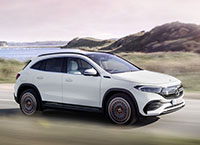
Mercedes is expanding its electric vehicle lineup rapidly, due to the goal of providing a “Carbon Neutral” model lineup by 2039, with the latest plug-in offering possibly its most important being that it’s the gateway into three-pointed star EVs.
When (or if) the EQA is sold into the Canadian market (we shouldn’t expect it before calendar year 2022), it will most likely be Mercedes’ most affordable EV. Designed to slot below the EQC, which was originally scheduled to launch later this year but will likely arrive next year, the EQA will initially combine for a three-way EV lineup topped off by the full-size EQS luxury sedan and SUV variant (although the EQE sedan and SUV are expected to join below the EQS models, these targeting Tesla’s Model X and Audi’s E-Tron and E-Tron Sportback).
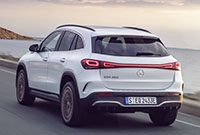
Mercedes is obviously targeting the Tesla Model S, Porsche Taycan, and Audi E-Tron GT Quattro with the latter (or maybe more so with the upcoming EQE sedan), as well as the Tesla Model Y and Jaguar i-Pace with the EQC, whereas only the Volvo XC40 Recharge competes directly with the EQA (and to some extent the BMW i3), allowing a fairly open market in the electrically-powered subcompact luxury SUV market segment. This could change in the next year or so, however.
According to Mercedes-Benz Canada President and CEO, Brian Fulton who was addressing journalists attending the Montreal International Auto Show in January of 2019, the EQS, EQC and this EQA model will initiate a 10-model EQ lineup of new EVs, with one of the others including an EQB (based on the GLB subcompact SUV).
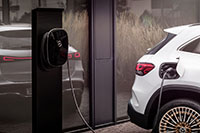
While the EQC’s dual electric motors produce 300 kilowatts (402 horsepower) and 564 lb-ft of torque, the smaller EQA’s initial 250 trim line will offer a single electric motor with 140 kW (188 hp), focusing more on efficiency than performance. A more capable performer is expected to make approximately 200 kW (268 hp) through a second electric motor driving an opposing set of wheels, this resulting in all-wheel drive. A thin battery gets spread out below the floor in order to maximize interior space, enhance weight distribution, and lower the model’s centre of gravity to optimize handling.
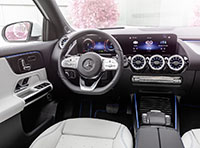
Of utmost importance, the EQA’s range is said to be about 500 kilometres on a single charge (depending on the model chosen), based on Europe’s somewhat optimistic NEDC and WLTP standards (we should expect this number to be downsized when the EQA hits North American markets).
Making the most of stored electricity, the EQA will utilize an intelligent navigation system that plots out the most efficient routes possible after calculating real-time traffic information, as well as terrain, weather conditions, driving style, and charging requirements.
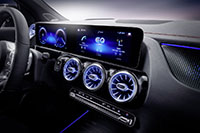
Further aiding efficiency, Mercedes has incorporated a standard heat pump to channel the warmth generated from the EQA’s electric powertrain into the passenger compartment. Eco Assist aids battery usage too, while plenty of advanced driver assistive systems and electronic safety technologies have been designed to protect everyone onboard.
While most might think Mercedes used one of its wind tunnels to perfect the EQA’s impressive 0.28 drag coefficient, the reality is that such aerodynamics were achieved digitally, a first for the German carmaker. Therefore, the EQA’s smooth exterior shell with nearly flush headlights and grille, plus its arcing coupe-like roofline, wind-cheating alloys, and almost completely enclosed underbelly were the result of computer simulations.
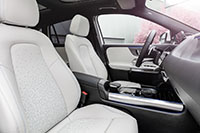
Just the same, there’s no denying the EQA’s GLA-Class roots. The new electric shares architectural hard points with Mercedes’ smallest gasoline-powered SUV, just like the brand’s other EQ models utilize the underpinnings of their similarly named counterparts.
Mercedes has added blue accents to the headlight clusters for a bit more personality, while an LED light strip visually connects those lenses with daytime running lamps that span across the grille. The theme gets used similarly for the SUV’s hind quarters too, which show organically-shaped LED taillights visually connecting through a narrow reflector that spans the back hatch.
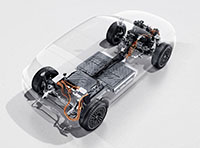
Inside, the EQA should look familiar to anyone who’s experienced a modern-day Mercedes model. The instrument panel is highlighted by the automaker’s dual-screen MBUX display, featuring a digital primary instrument cluster to the left and an infotainment touchscreen on the right, the latter controllable via a touchpad and buttons on the lower centre console as well. Together with such systems’ normal functions, the two EQA displays will feature a bevy of EV-specific graphic interfaces.
Just like with its gasoline-powered models, Mercedes also integrates ambient lighting to highlight key interior design elements in the EQA. Materials quality should be up to par as well, while an optional rose gold trim package should match similarly coloured smartphones.
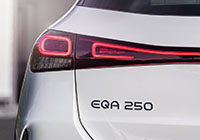
Although Mercedes’ EQA is not yet available for purchase, those wanting an efficient subcompact luxury SUV should consider the brand’s GLA-Class, which is currently being offered with up to $1,000 in additional incentives, or if you can still manage to find a new 2020 model (2020 was a rough year for car sales after all) you may be able to save up to $5,000 in additional incentives.
To find out more, visit our 2021 Mercedes-Benz GLA Canada Prices and 2020 Mercedes-Benz GLA Canada Prices pages, plus remember that a CarCostCanada membership can provide yet more savings from factory rebates (when available), manufacturer leasing and financing deals (when available), and always available dealer invoice pricing that can save you thousands when negotiating your deal. Check out how easy the CarCostCanada system is to use and how affordable it is, plus be sure to download the free CarCostCanada app from the Apple Store or Google Play Store.
Story credits: Trevor Hofmann
Photo credits: Mercedes-Benz
